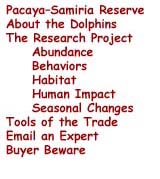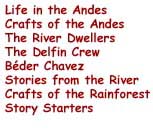|
|

|
Tamara
McGuire
|
Why did you become a wildlife biologist?
I became a wildlife biologist because I love animals. Many
different professions are available to people who love animals and want
to work with them. Some examples are being a veterinarian, a worker
at an animal shelter, a wildlife photographer, or a zookeeper. I chose
to be a wildlife- biologist because I love to watch and study animals
in their natural habitats.
Also, I know that many wild animals are in trouble because they do
not have much natural habitat left. I want to learn more about wild
animals and the problems they are facing. If we understand the animals
and their problems, we can try to help them.
Who have been role models and/or mentors for you?
I have been lucky to have many role models in my life. My
family has always taught me that I can be anything that I want to be,
but that I have to be willing to work hard enough to get it. My parents
both went back to school after they were married and had children, and
by their example they have shown me that an education is very important,
and is worth sacrificing for.
As a young girl I loved reading about Dr. Marie Curie, who was a
famous chemist. She had to work hard to complete her education, but
she always loved her work and the discoveries that she made.
Jacques Cousteau inspired me to learn more about the aquatic environment,
and first got me interested in dolphins. Jane Goodall, who studies
chimpanzees in Africa, first showed me that people can make careers
out of watching animals, and also that years of quiet, patient observation
can often lead to very important discoveries. An favorite elementary
school teacher, Ms. Anne Wills, taught me that the world is not fair,
but we must do what we can to make things better. Dr. Mary Silver,
a professor of Oceanography at the University of California at Santa
Cruz, showed me that a woman can be a University professor and an
excellent scientist, while still being passionate and emotional about
her work.
The volunteers with the Oceanic Society have shown me that there
are many people in the world who are full of curiosity and who want
to discover more about the world and want to help study river dolphins.
My older Oceanic Society volunteers have been great examples that
people are never too old (or too young) to keep exploring and learning
about the world.
What skills does it take to be a wildlife biologist?
Some skills that it takes to be a be a wildlife biologist
are patience, a good sense of observation, curiosity, paying attention
to detail, good basic math skills, and good writing skills. These days,
most wildlife biologists also need computer skills, although many biologist
in other countries don't have computers and are still excellent biologists.
Sometimes you also have to be stubborn and determined, because it
is not always an easy life, although it is always worthwhile. You
will never be rich if you are a wildlife biologist, and you will often
be away from your family and friends. The insects in the Amazon can
make life very uncomfortable, and sometimes the days seem very hot
and long. You can't just go to the movies or order a pizza when you
want a break.
Sometimes I am sad when I see that Peruvian friends are sick and
that there is no doctor to help them or their families. On the other
hand, you will get to experience things in nature that you can't see
on TV, and you will have the satisfaction of knowing that you are
trying to make a difference in the world.
In my particular specialty, I also need to know how to speak Spanish,
how to work with people, how to use a camera, how to drive a small
boat, and how to repair my own equipment. It is also a good idea to
know first aid if you are going to be working in remote areas.
What level of education is required?
At a minimum, a wildlife biologist needs to have a bachelor's
degree in wildlife biology, ecology, or biology. To do independent research,
a wildlife biologist should have a master's degree in wildlife biology.
The highest degree is a Ph.D., which is also called a doctorate. I am
studying for my Ph.D. so I can learn all that I can about river dolphins,
and also to be able to be the leader of a research team and to design
my own investigations.
What interested you in studying river dolphins?
I am interested in studying river dolphins for many reasons.
I have always been interested in dolphins, whether they live in the
oceans or rivers. They are mammals like us, yet live in an aquatic environment
that is so different from our land environment. Imagine living your
entire life in the water!
They are so different from us in the ways that they move, communicate,
see, eat, hear, and sleep, yet they are like us in so many ways. For
example, dolphins are warm blooded, communicate with one another,
and the mothers nurse their young. They are very intelligent.
River dolphins are especially interesting to me, because they are
such unusual and mysterious animals. They are only found in a few
places in the world, and most people don't think of river dolphins
when they think of dolphins. Some people think river dolphins are
ugly, but I like them because they are different looking and unique.
River dolphins are also in trouble in some parts of the world. We
really don't know much about river dolphins, and I think it is important
to learn all that we can about them, before it is too late.
What new knowledge do you hope to gain from the expedition?
With every expedition I learn more about the dolphins. I want
to know where they are, if their numbers have changed since the last
expedition, when they are having their babies, how their habitat has
changed , and which of the individual dolphins I can recognize from
previous trips. I also want to know how people and dolphins are interacting.
Some of these questions can only be answered little by little, and I
want to compare the data from each expedition with all of the data from
pervious expeditions to be able to see if there are any patterns. Each
individual expedition is important, because I learn something new about
the dolphins and their habitat every time, but it is also important
to be patient and look at the information from all of the expeditions
together.
Back to top
|






